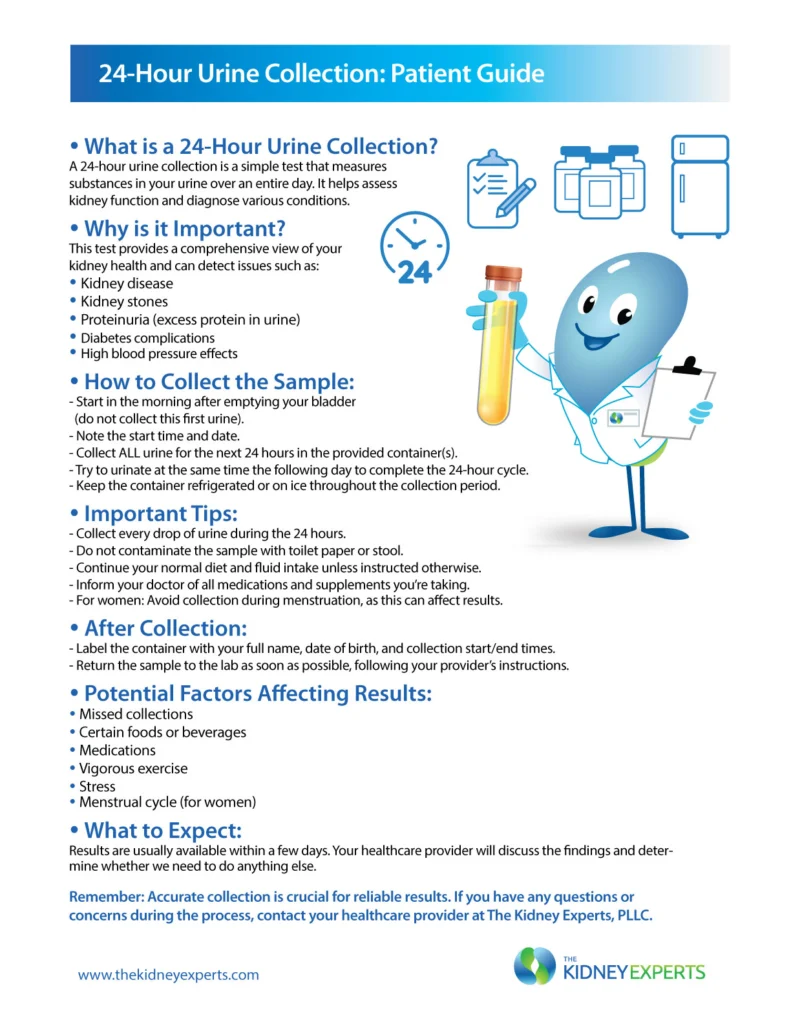Here is a comprehensive guide to 24-hour urine collection studies for patients of The Kidney Experts.
24-Hour Urine Collection Studies: A Patient Guide
As specialists dedicated to providing cutting-edge kidney care and working towards eliminating the need for dialysis, we at The Kidney Experts often recommend 24-hour urine collection studies. These tests provide valuable information about your kidney function and help us tailor your treatment plan. This guide will explain the process, types of tests, and importance of 24-hour urine collection.

What is a 24-Hour Urine Collection?
A 24-hour urine collection is a simple yet crucial test that measures various substances in your urine over an entire day. This comprehensive sampling gives us a more accurate picture of your kidney function than a single urine sample[1].
Why is it important?
Your kidneys filter waste products from your blood and excrete them in urine. By analyzing your urine over 24 hours, we can assess how well your kidneys perform this vital function[1].
How to Perform a 24-Hour Urine Collection
Follow these steps carefully to ensure accurate results:
- Begin the collection in the morning. Empty your bladder and flush this first urine – do not collect it[6].
- Note the exact time. This is your start time[6].
- For the next 24 hours, collect ALL urine in the provided container(s)[6].
- Try to urinate at the same time the next morning to complete the 24 hours [6].
- Keep the urine container refrigerated or in a cool place throughout the collection period[6].
- Label the container with your full name, date of birth, and collection start and end times[6].
- Return the container to the laboratory as instructed, typically within a few hours of completing the collection[6].
Types of 24-Hour Urine Tests
Depending on your specific health concerns, we may order one or more of the following tests:
1. Protein (Proteinuria) Test
Purpose: Measures the amount of protein in your urine[1].
What it tells us: Normally, very little protein should be present in urine. Elevated levels can indicate kidney damage or disease[1].
Normal range: Less than 150 mg per 24 hours[5].
2. Creatinine Clearance Test
Purpose: Assesses how well your kidneys filter waste products[8].
What it tells us: This test helps estimate your glomerular filtration rate (GFR), a key indicator of kidney function[8].
Normal range:
- Males: 955 to 2,936 mg per 24 hours
- Females: 601 to 1,689 mg per 24 hours[8]
3. Urea Clearance Test
Purpose: Measures the amount of urea nitrogen in your urine[9].
What it tells us: Like creatinine, urea clearance helps assess kidney function[9].
Normal range: 6-17 g per 24 hours[9].
4. Electrolyte Analysis
Purpose: Measures levels of various electrolytes in your urine[11].
What it tells us: Helps assess electrolyte balance and kidney function[11].
Normal ranges:
- Sodium: 40-220 mEq per 24 hours
- Potassium: 25-125 mEq per 24 hours
- Chloride: 110-250 mEq per 24 hours[11]
5. Vanillylmandelic Acid (VMA) Test
Purpose: Measures VMA, a breakdown product of certain hormones[12].
What it tells us: Elevated levels can indicate certain tumors or conditions affecting the adrenal glands[12].
Normal range: 0.0-7.5 mg per 24 hours[12]
6. Metanephrines Test
Purpose: Measures metanephrines, which are breakdown products of epinephrine and norepinephrine[3].
What it tells us: Elevated levels can indicate certain tumors like pheochromocytoma[3].
Normal range: Varies by laboratory; your doctor will interpret the results.
7. Stone Risk Profile
Purpose: Analyzes various factors that contribute to kidney stone formation[1].
What it tells us: Helps identify specific risk factors for kidney stones and guide prevention strategies[1].
Factors analyzed: May include calcium, oxalate, citrate, and uric acid levels.
Preparing for Your 24-Hour Urine Collection

- Choose a day when you can stay at home to ensure complete collection[13].
- Continue your normal diet and fluid intake unless instructed otherwise[13].
- Inform your doctor of all medications, supplements, and herbal remedies you’re taking, as some may affect the results[13].
- For certain tests (like VMA), you may need to avoid specific foods for a few days before the collection[12].
- If you’re menstruating or have a urinary tract infection, the test may need to be postponed[13].
Important Reminders
- Collect ALL urine during the 24-hour period. Even a small amount missing can affect the results[13].
- Keep the collection container always cool to preserve the sample[13].
- Do not contaminate the urine with toilet paper, stool, or other substances[13].
- You may need to start over if you miss a collection or spill urine. Contact our office for guidance[13].
Conclusion
24-hour urine collection studies are invaluable tools in our mission to provide cutting-edge kidney care. By following these instructions carefully, you’re helping us gather the most accurate information about your kidney health. This allows us to tailor your treatment plan and work towards our goal of eliminating the need for dialysis.
If you have any questions about the collection process or why we’ve ordered these tests, please don’t hesitate to contact us at The Kidney Experts. We’re here to support you every step of the way in your kidney health journey.
Remember, knowledge is power when it comes to managing kidney health. By participating in these tests, you’re taking an active role in your care and helping us provide you with the best possible treatment.
Citations:
[1] https://www.healthline.com/health/24-hour-urine-protein
[2] https://www.ncbi.nlm.nih.gov/books/NBK482482/
[3] https://www.urmc.rochester.edu/encyclopedia/content.aspx?contentid=metanephrine_urine&contenttypeid=167
[4] https://www.mountsinai.org/health-library/tests/creatinine-urine-test
[5] https://www.mountsinai.org/health-library/tests/24-hour-urine-protein
[6] https://www.urmc.rochester.edu/encyclopedia/content.aspx?ContentID=P08955&ContentTypeID=92
[7] https://www.urmc.rochester.edu/encyclopedia/content.aspx?contentid=urine_protein_24_hour&contenttypeid=167
[8] https://www.healthline.com/health/creatinine-clearance
[9] https://www.labcorp.com/tests/317222/urea-nitrogen-and-creatinine-profile-24-hour-urine
[10] https://www.labcorp.com/tests/003012/creatinine-24-hour-urine
[11] https://www.saintlukeskc.org/lab-test-directory/electrolytes-quantitative-24-hour-urine
[12] https://www.labcorp.com/tests/004143/vanillylmandelic-acid-vma-24-hour-urine
[13] https://www.hopkinsmedicine.org/health/treatment-tests-and-therapies/24hour-urine-collection
[14] https://www.nationwidechildrens.org/family-resources-education/health-wellness-and-safety-resources/helping-hands/24-hour-urine-specimen-collection-guidelines


